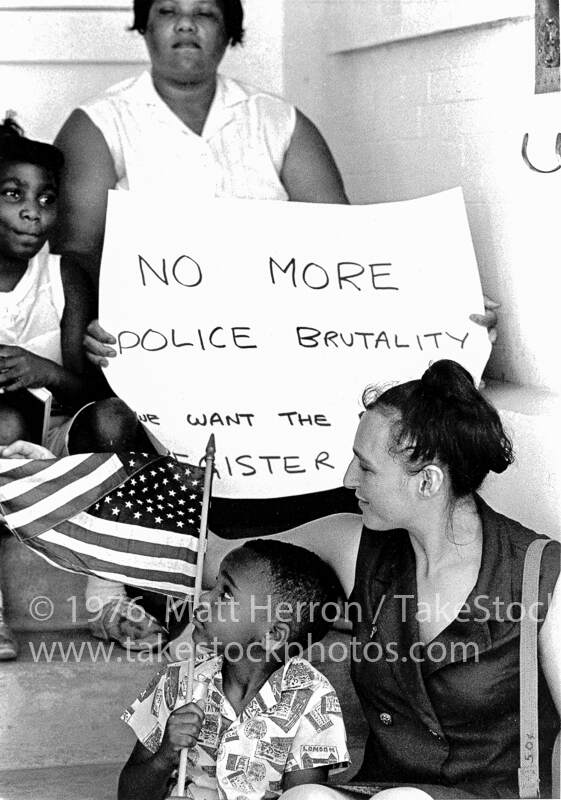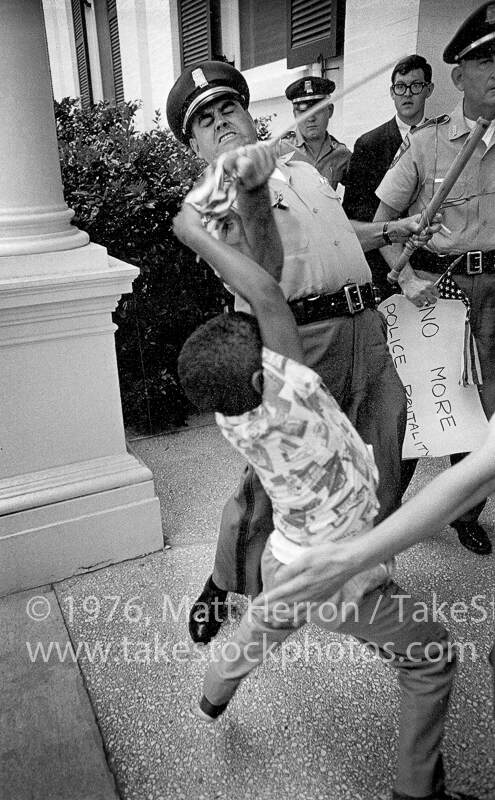Aylene Quin
October 12, 1920 – July 6, 2001
Raised in Walthall County, Mississippi

Mrs. Aylene Quin and her children try to see Mississippi Governor Paul Johnson to protest seating of five white congressman, June 17, 1965, Matt Herron, Take Stock
When SNCC came to small towns like McComb, Mississippi, people like Aylene “Mama” Quin were essential to their survival and taught them much. Quin was a longtime member of the NAACP and had been volunteering her restaurant, South of the Border, for underground meetings since the mid-fifties. “Mama Quin is kind and good to everyone, but more than that, she is a towering figure of strength. She can’t be intimidated,” recalled SNCC’s Mendy Samstein. She made sure there was food to eat and a place to meet in McComb, and she was excited about the new energy the young SNCC folks brought in 1961.
Born in Walthall County, Quin grew up wrestling with the complexity of living in a system of white supremacy. As a child, she observed the relationship between her grandfather and his white half-sister and would have conversations with her grandmother about Blackness in America, “She would say that the 4th of July wasn’t for black people. Said in May, that’s when we was free.” This was probably a reference to the Emancipation Proclamation which, though issued January 1, 1863, reached various parts of the South on different dates.
In 1943, Quin moved to Biloxi, Mississippi for her first job. The U.S. Army had recently designated the Keesler Army Airfield in Biloxi as a World War II training support site, and Quin went to work in their laundry department. While in Biloxi, Quin joined the NAACP and got interested in voting. By the time she came to McComb in 1953, she was already a registered voter.
McComb’s NAACP had taken on a new kind of energy by the mid-fifties. Movement stalwarts Webb Owens and C.C. Bryant increased membership by over 50 percent, and many of those new members were World War II veterans or small business owners like Aylene Quin. However, it was also a dangerous time for NAACP members in Mississippi, who were constantly terrorized by white community. Quin remembered, “If you were a member of the NAACP you kept it kind of a secret. If you had any kind of a job or anything you couldn’t let it be known.” So, when Bob Moses arrived in McComb and brought new life to voter registration efforts, it was just what she hoped to see happen in her town.

A patrolman struggles for possession of the flag held by Aylene Quin’s son, Anthony, age 5, June 17, 1965, Matt Herron, Take Stock
Quin supported more than voter registration, however. Many parents were furious about their children’s involvement in the Burglund student walkout, calling SNCC a “bunch of troublemakers.” But Quin stood by her daughter Carolyn and demanded that the students be readmitted without signing the pledge.
She also stood by SNCC with the revival of movement activity in Southwest Mississippi during Freedom Summer in 1964, despite risk to herself and her family. “Three years ago she was one of the first to welcome Moses and lend him and the SNCC workers her support. Her cafe has always been open–despite the threats. And this summer, again she leads the community,” said Samstein. Her restaurant became the location for secret meetings between the Council of Federated Organizations (COFO) and local businessmen. They would arrive in the back of a delivery truck and use passwords at a side entrance to enter unnoticed. There, they organized food and housing committees to assist the volunteers and raised enough money to build a community center for Pike County.
This fearless support from Quin didn’t come without a cost. On September 20, 1964, her house on 304 Summit Street was bombed. Thankfully, her children, who were home at the time, escaped with only minor injuries. When McComb police accused Quin of bombing her own home, she ridiculed the charge as defying common sense. One day after the bombing, she traveled to Washington D.C. to meet with Justice Department officials and privately with President Lyndon Johnson (who met with her against the advice of his top advisors) and demanded increased federal protection for Black people in McComb and the South. Mama Quin continued to stay active in the Movement, acting as a pillar of resilience in her community for years to come.
Sources
Charles E. Cobb, Jr., On the Road to Freedom: A Guided Tour of the Civil Rights Trail (Chapel Hill: Algonquin Books, 2007).
John Dittmer, Local People: The Struggle for Civil Rights in Mississippi, (Urbana: University of Illinois Press, 1995).
Wesley Hogan, Many Minds, One Heart: SNCC’s Dream for a New America (Chapel Hill: University of North Carolina Press, 2007).
Interview with Aylene Quin by Jane Adams, June 3, 2000, Transcript in possession of Jane Adams.
Copy of Affidavit of Mrs. Alyene Quin in “Bombings & Burnings,” 1964, Candy Brown papers, Wisconsin Historical Society.




